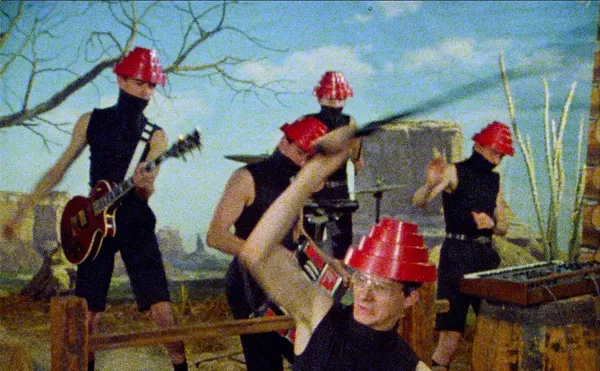A few weeks ago, on a particularly dark and stormy night, two dozen die-hard fans of the local poetry scene dodged downpours and lightning bolts to take in the monthly reading at Zeitgeist Gallery near Tiger Stadium. Among the readers was Chilean native Mariela Griffor, the Grosse Pointe Artists Association poet-in-residence for this year. A petite woman in her mid-forties, Griffor wore a simple yellow dress, denim jacket and turquoise-beaded necklace as she stood before a red table on the bare plywood stage reading aloud from her forthcoming book of poems, Love for a Subversive Man. By simply looking at her, you wouldn’t imagine that Griffor’s work is the result of a life experience as violent as the thunderstorms booming outside.
The title of her new collection honors her first husband, a political activist assassinated by Augusto Pinochet’s secret police in 1985, and the poems within draw on her years in exile during the Chilean dictator’s brutal regime.
“I don’t have any political agenda, not anymore,” Griffor says over the phone before the Zeitgeist reading. Instead, Griffor now looks to art as a way of confronting harsh realities. In addition to her poetry, Griffor is the founder of Marick Press, a nonprofit literary publisher that recently released its first two titles, The Sleeping by Wayne State Univeristy professor Caroline Maun and A Complex Bravery by Californian Robert Lipton. Maun’s book has already been nominated for the prestigious Pushcart Prize in poetry.
“My goal is to find good literature, to find the best fiction and poetry from here and other areas, to find books that will change the way people think about things,” Griffor says. Detroit offers fertile ground for realizing that vision, she says, because there’s so much material to write about, from the economy to politics to race relations. Other Detroiters with books in the works at Marick include nationally known poet Robert Fanning, Daniel Padilla and James E. Hart III, curator of the Zeitgeist poetry series. Those books are due out in September with an event sponsored by the Detroit Symphony Orchestra.
Although she eschews direct politics these days, Griffor has firsthand experience with the potential of the written word making a political impact. She has vivid memories of the bloody day of Sept. 11, 1973, when Pinochet staged a violent coup that resulted in Chilean President Salvador Allende’s death.
“We were let go early from school and when I got home I found my grandfather and uncles were in the backyard burning all of the books in our library,” she says. The books were all by left-leaning poets like Chilean socialist Pablo Neruda and Federico García Lorca, who was assassinated by fascists in 1936 at the beginning of the Spanish Civil War.
“My grandmother made me memorize Neruda and García Lorca and perform them when relatives came to visit,” Griffor says.
She was studying journalism in Brazil in the mid-’80s when word came from home that the father of her unborn child was missing. A few days later, the mutilated body of Julio Carlos Santibanez Romero, poet, engineer and civil rights campaigner, was found. A month later, Griffor learned she too was likely to be arrested by Pinochet’s police, who at the time were permitted to operate freely in Brazil. She fled the country within 24 hours.
“Sweden and France were the only countries giving visas to Chileans then,” she says.
Griffor lived in Sweden for the next 12 years where she gave birth to and raised her daughter. She became a Montessori teacher and in 1988 met her second husband, Edward Griffor, a Grosse Pointe native who was working in Sweden on a mathematics research grant. An MIT graduate, he currently teaches at Wayne State.
When democracy was restored in Chile in the late ’90s, the Griffors, who now had a second daughter, went back, hoping to rebuild a life there.
They lasted 10 months. The Chilean economy was very shaky and the unstable conditions of a South American republic were too different from the staid life they were accustomed to in Sweden. Plus, her American husband had been away from home for almost 20 years and yearned to come back — so they came to the United States and settled in Grosse Pointe.
Griffor finished her journalism degree at Wayne State and worked for a while as an affordable-housing advocate. Now, somewhat unexpectedly, Griffor has become one of the Motor City’s newest literary impresarios.
“Writing for me is like breathing,” she says. “I’ve always written since I was small, but I never planned to be a writer or a poet.”
She says of getting her work released by Marick Press, “It wasn’t a longtime dream of mine; it was just about fulfilling a need.”
Be that as it may, the same determination that often inspires political action is usually necessary for success in the cultural arena, especially in a place like Detroit.
Griffor: “We’re trying to build a community [in Detroit] and I feel people are really hungry for that. We’re not tycoons, we want to find the voices that are out there. Mainstream publishing doesn’t really have a lot to do with culture and that’s just not right.”
See Also::
Mariela Griffor
Fan the fire
A poem from Robert Fanning’s new book.
Mariela Griffor and Caroline Maun will read at 7 p.m. on Saturday, July 15, at Izzy’s Raw Art Gallery (2572 Michigan Ave., Detroit; 248-207-7547). Admission is $5.
Vince Carducci writes about art for Metro Times. Send comments to [email protected].





